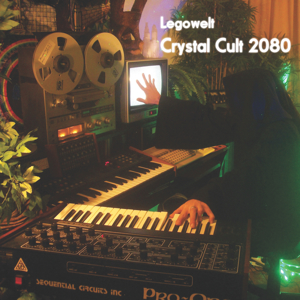Legowelt Crystal Cult 2080
Legowelt‘s creative pool runs deep. More than almost any producer in recent years, the Dutchman […]

Legowelt‘s creative pool runs deep. More than almost any producer in recent years, the Dutchman has released material at a mind-boggling pace while maintaining a consistent level of quality. Countless remixes, compilation tracks, and a string of EPs have filled the 15-month space between his 2012 LP, The Paranormal Soul, and Crystal Cult 2080, but somehow, Legowelt still hasn’t tapped his well dry; his latest album finds the veteran producer delivering yet another solid effort.
Although his affection for cosmic themes and vintage sounds can, for some, come uncomfortably close to gimmick, there is still something undeniably charming about Legowelt. A sort of uncomplicated love for dance music can’t help but shine through on his productions, and Crystal Cult 2080 is no different. Perhaps one of the reasons Legowelt has been able to be so prolific throughout his career is because he does not overthink his tracks, and, to that point, the construction of Crystal Cult 2080‘s efforts are simple enough. Here, the bottom-loaded drum machines do the heavy lifting, loosely pulsing beneath dense layers of interlaced hardware synths—both analog and digital, as the record’s accompanying literature and title, which takes its inspiration from Roland’s ’90s-era JV-2080 synth, point to. The resulting 10 tracks are left suspended between sci-fi electronics and deep warehouse workouts, with various streaks of vintage dance music strewn throughout the record.
To a certain degree, Crystal Cult 2080 exists within the familiar Legowelt sound. Still, to call it formulaic would be a stretch. As always, Legowelt finds ways to bend and twist his usual sonic palette into a number of different shapes and sizes. Album standouts “Fundamental Superstition” and “When the Spring Comes Again” are perhaps the most recognizable within Legowelt’s cannon, while tracks like the trippy “The Future of Myself” and the sinister “Psychotic Endurance” take slight but nonetheless unexpected detours, especially in terms of their rhythms, which provide a welcome expansion on the rest of the record’s more straightforward four-on-the-floor.
Like many of Legowelt’s releases, Crystal Cult 2080 seems uninterested in fitting in to any particular corner of contemporary club music. There are hints of house, techno, electro, and more across the album’s 10 celestial, hardware-fueled tracks, but on the whole, Legowelt is simply being Legowelt, and it’s hard to fault him for that; with a career that spans almost two decades, continuing to follow his own personal muse has certainly served him well. Crystal Cult 2080 may not be a “game-changing” LP, but defining it as anything but quality would be a mistake, especially considering that Legowelt likely has many more of these records left in him.

